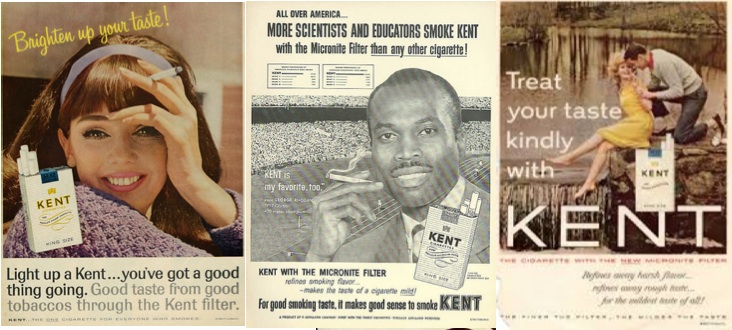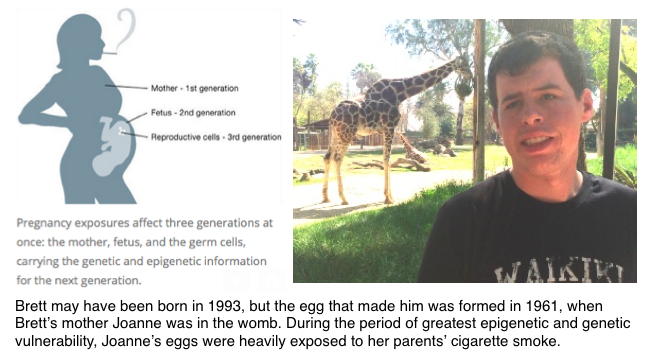|
by Joanne Wickersham
I was born in 1961 in San Jose, California, to a family that has no history of autism, mental disorders, or developmental disorders. My older sister has no children, and I have one, a son born in 1993, named Brett. His early development as a toddler deviated from the norm by 16 months, and at three years old he was diagnosed with autism. He's now a 6'1" 21 year old young man, who is autistic and intellectually disabled (though very sweet and kind) and will need support for his entire life. There were no clear risk factors causing Brett's significant neurodevelopmental disabilities. I am healthy, my ex-husband was healthy. Some years after I had Brett I found out that I had some placental abnormalities that may have caused Brett to be born somewhat small, 5 pounds 6 ounces, but it's unclear if that is sufficient to have caused his significant mental disability. Brett has no genetic disorders or syndromes from what anyone can tell. But I wonder if perhaps he does, in a subtle fashion. I was born in the 1960s when no one thought anything about women smoking in pregnancy. It was not only normal, some doctors advised their pregnant patients to smoke to curb their appetites and keep off weight. My mother was a habitual smoker, smoking a pack a day of Kent cigarettes. She succumbed to lung cancer at age 60. My father was also a heavy, multi-packs-a-day smoker, which meant as a fetus I was also exposed to his second-hand smoke. I cannot help but wonder if my mother's heavy and continuous smoking, every day throughout my gestation, combined with my father's added layer, subtly damaged my eggs, which of course were developing at the time I was in her womb. All those exposures are in a sense "locked into" the eggs, which reprogram and then slip into a sort of hibernation before we are born. Cigarette smoke contains an abundance of toxic chemicals, many of which are known mutagens, and now, known epimutagens. This idea makes sense to me. I encourage the autism research community to investigate the idea that these past exposures that happened when we autism parents were in the womb could have had a toxic generational effect due to germline impacts. The author lives in Silicon Valley.
0 Comments
Your comment will be posted after it is approved.
Leave a Reply. |
AuthorJill Escher, Escher Fund for Autism, is a California-based science philanthropist and mother of two children with severe autism, focused on the question of how environmentally induced germline disruptions may be contributing to today's epidemics of neurodevelopmental impairment. You can read about her discovery of her intensive prenatal exposure to synthetic hormone drugs here. Jill is also president of Autism Society San Francisco Bay Area. Archives
July 2021
Categories |
- Home
-
Expert Q&A
- Eva Jablonka Q&A
- Amander Clark Q&A
- Mirella Meyer-Ficca Q&A
- Janine LaSalle Q&A
- Dana Dolinoy Q&A
- Ben Laufer Q&A
- Tracy Bale Q&A
- Susan Murphy Q&A
- Alycia Halladay Q&A
- Wendy Chung Q&A
- Pradeep Bhide Q&A
- Pat Hunt Q&A
- Yauk and Marchetti Q&A
- Emilie Rissman Q&A
- Carol Kwiatkowski Q&A
- Linda Birnbaum Q&A
- Virender Rehan Q&A
- Carlos Guerrero-Bosagna Q&A
- Randy Jirtle Q&A
- Jerry Heindel Q&A
- Cheryl Walker Q&A
- Eileen McLaughlin Q&A
- Carmen Marsit Q&A
- Marisa Bartolomei Q&A
- Christopher Gregg Q&A
- Andrea Baccarelli Q&A
- David Moore Q&A
- Patrick Allard Q&A
- Catherine Dulac Q&A
- Lucas Argueso Q&A
- Toshi Shioda Q&A
- Miklos Toth Q&A
- Piroska Szabo Q&A
- Reinisch Q&A
- Klebanoff Q&A
- Denis Noble Q&A
- Germline in the News
- Science
- Presentations
- About Us
- Blog
Proudly powered by Weebly



 RSS Feed
RSS Feed